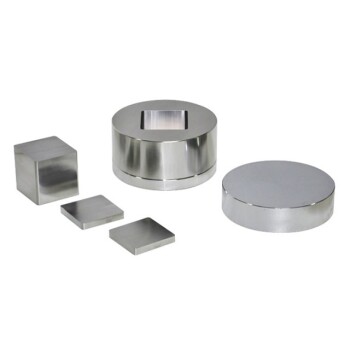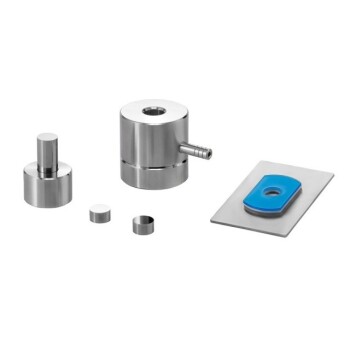At its core, a laboratory press is a highly adaptable tool, not a one-size-fits-all machine. The primary customization options revolve around its core functions: the available pressure (tonnage), the operational temperature range, the physical dimensions of the pressing surface (platen size), and the sophistication of its control system. These elements can be specified to precisely match the demands of applications ranging from materials science to sample preparation.
Choosing a laboratory press is not about maximizing specifications, but about achieving a balanced system. The true goal is to align the press's pressure, thermal capabilities, and control systems with your specific scientific application to ensure accurate, repeatable, and well-documented results.

Core Customization Pillars: Pressure, Heat, and Size
The most fundamental specifications of any press are its physical and thermal capabilities. Getting these right is the first step toward configuring a machine that meets your needs.
Defining Pressure Requirements (Tonnage)
The force a press can exert, measured in tons, is its most defining characteristic. The required tonnage is dictated entirely by your application.
Forming dense KBr pellets for FTIR spectroscopy, for example, requires significant pressure. Other applications, like crushing plant tissue for fluid extraction, may have less demanding force requirements.
Specifying Thermal Capabilities
Many modern lab processes, especially in polymer and materials science, require heat. Presses can be equipped with heating systems, often featuring programmable digital controllers.
Standard models can reach temperatures up to 250°C, with some specialized units going higher. Advanced configurations include dual built-in heaters and thermometers for exceptionally uniform temperature distribution across the platens, which is critical for consistent sample molding.
Matching the Physical Footprint (Platen and Die Size)
The platen is the flat surface where pressing occurs. Its size, typically measured in inches or millimeters, must be large enough to accommodate your samples or molds.
Larger platens offer flexibility, while smaller platens are suitable for compact labs. Presses are also designed to be used with pellet press die sets, allowing you to produce solid pellets of varying diameters from powdered samples.
Beyond the Basics: Control, Automation, and Accessories
For research and quality control, simple manual operation is often insufficient. Advanced controls and accessories transform a basic press into a precision instrument.
The Need for Precision Control
Modern presses replace analog gauges with digital displays for both pressure and temperature. This allows for precise, repeatable operation and removes ambiguity from your process parameters.
Automating for Consistency
Higher-end models feature programmable controls that allow you to define multi-step processes. You can set heating rates, hold times, and pressure ramps.
These automated cycles, often paired with digital timers and audible alarms, ensure that every sample is processed under identical conditions, which is crucial for achieving reproducible results.
Ensuring Data Integrity with Logging
For labs operating under strict quality control or for detailed research documentation, data logging capabilities are invaluable. These systems record the precise temperature and pressure profiles for each run, providing a verifiable record of the experiment.
Expanding Functionality with Accessories
The utility of a press can be greatly expanded with accessories. Beyond pellet dies, common additions include tube and vial crimpers/decappers for sample sealing and vacuum pump systems for processes that must be performed in a controlled atmosphere.
Understanding the Trade-offs and Practical Considerations
Specifying a press involves balancing performance with practical realities like lab space, usability, and long-term reliability.
Physical Layout and Ergonomics
Most laboratory presses are designed for bench or countertop use. For heavier or larger models, optional pedestals are available to convert them into floor-standing units.
In shared or smaller labs, factors like a quiet motor and a compact design become significant practical advantages.
The Hidden Cost of Neglected Maintenance
A press is a powerful hydraulic machine that requires regular care. Choosing a model with accessible parts can simplify this.
Regularly inspect hoses and seals for leaks, keep moving parts lubricated, and follow the manufacturer's schedule for changing hydraulic fluid. Neglecting maintenance compromises both safety and performance.
Planning for Future Flexibility
Consider a press that is part of a larger ecosystem of accessories. A manufacturer that offers a wide range of compatible pellet dies, molds, and other tools gives you the ability to adapt the press to new projects in the future without replacing the entire unit.
How to Specify the Right Press for Your Goal
Use your primary application to guide your decision-making process.
- If your primary focus is materials testing (e.g., polymers): Prioritize precise, programmable temperature control and integrated data logging to capture process variables.
- If your primary focus is sample preparation (e.g., pellets for spectroscopy): Focus on the available pressure range and compatibility with a wide selection of pellet die sizes.
- If your primary focus is high-throughput or process replication: Advanced automation features like programmable cycles, timers, and alarms are essential for consistency.
- If your primary focus is general-purpose lab work: A compact, quiet, low-maintenance benchtop model with compatibility for various accessories offers the most versatility.
By systematically evaluating these options against your specific application, you can configure a laboratory press that functions as a precise and reliable extension of your research.
Summary Table:
| Customization Option | Key Features | Ideal Applications |
|---|---|---|
| Pressure (Tonnage) | Adjustable force in tons | FTIR pellet preparation, material compression |
| Thermal Capabilities | Programmable heating up to 250°C+ | Polymer molding, uniform sample heating |
| Platen and Die Size | Various dimensions and pellet die sets | Sample molding, high-throughput tasks |
| Control Systems | Digital displays, programmable cycles | Reproducible results, automated processes |
| Accessories | Vacuum pumps, crimpers, data logging | Controlled atmospheres, quality documentation |
Ready to customize a lab press that fits your exact needs? At KINTEK, we specialize in automatic lab presses, isostatic presses, heated lab presses, and more, designed to serve your laboratory's unique requirements. From precise pressure control to advanced heating systems, our solutions ensure accurate, repeatable results for materials science and sample preparation. Don't settle for a one-size-fits-all machine—contact us today to discuss how we can enhance your lab's efficiency and productivity!
Visual Guide

Related Products
- Automatic Laboratory Hydraulic Press Lab Pellet Press Machine
- Automatic Laboratory Hydraulic Press for XRF and KBR Pellet Pressing
- Laboratory Hydraulic Split Electric Lab Pellet Press
- Manual Laboratory Hydraulic Press Lab Pellet Press
- Laboratory Hydraulic Press Lab Pellet Press Machine for Glove Box
People Also Ask
- What are the limitations of hand-operated presses? Avoid Sample Compromise in Your Lab
- How does a hydraulic press aid in XRF spectroscopy? Achieve Accurate Elemental Analysis with Reliable Sample Prep
- What is the purpose of creating pellets for XRF spectroscopy using a hydraulic press? Ensure Accurate and Repeatable Elemental Analysis
- What are the key steps for making good KBr pellets? Master Precision for Flawless FTIR Analysis
- How do hydraulic pellet presses contribute to material testing and research? Unlock Precision in Sample Prep and Simulation



















